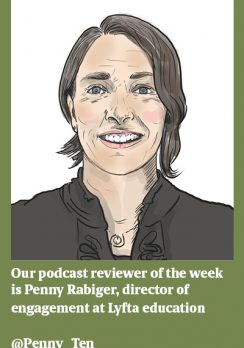Sustainability: what is it and why should we care?
@zaharachowdhur2
Zahara Chowdhury’s podcasts cover all the things we wish we’d learned at school. From wellbeing to finance, from prejudice to the school system itself, the aim is to give students, teachers and professionals a voice to discuss what they think school should be for our teachers, students and communities.
Here, Chowdhury is in conversation with business and sociology undergraduate, Louise. We learn how daily micro-choices can have a positive impact on the planet and our lives. With all the attention on global policy at COP26, it’s sometimes difficult to know where to start and what we can do. This discussion is bound to inspire you towards small but effective actions you can take at school today.
Teaching Sustainability
@TeachStarter
This Australian podcast showcases real, everyday teachers sharing tips and ideas for teaching. This episode features primary school teacher Emma talking about all things green, following her own experience of teaching sustainability.
As someone who hadn’t previously been particularly engaged with the topic, Emma starts by taking us through some alarming stats she wishes she’d known. She then goes on to suggest ways teachers can reduce plastic waste, and other top tips. An excellent place to build your sustainability repertoire.
Why we need education for human flourishing
@Imanewteacher
In this episode of a podcast series that bills itself as “important conversations with the best minds in education and leadership”, we hear from Dr Anantha Duraiappah, director of UNESCO’s Mahatma Gandhi Institute of Education for Peace and Sustainable Development (MGIEP) in New Delhi.
Dr Duraiappah’s focus is on researching and exploring how “firing Gandhi neurons” can be integrated into the curriculum of formal, informal and non-formal education systems around the globe. I won’t do the concept justice in the space I have here, but if you’re interested in systems thinking, critical thinking, economics and maths as skills that young people need, listen on. You might be surprised by his views on rationality, irrationality and the place of emotion in decision-making on things like climate change.
The Global Goals
@Mr_Minchin
This podcast is yet another example of Scottish primary school teacher Blair Minchin’s creative and innovative genius. Each episode features pupils talking about school subjects, curriculum, wellbeing and more. In this episode, we hear from Alfie, a pupil who is passionate about the Sustainable Development Goals. He talks about what they mean to him, how schools and pupils can help drive the principles to accomplishment and what he hopes they will do for the world.
It’s a great example of what’s possible, not only to check that pupils understand what they’re learning but also to help them develop their oracy skills. A lovely window into what teacher-pupil conversation can look like. Plus Alfie is cute as heck.
COP This!
@wosdec
Also from Scotland (because our Scottish colleagues are so far ahead in incorporating social justice and environmental sustainability) is a podcast episode entitled COP This!
In it, Friends of the Earth Scotland energy and climate campaigner Caroline Rance gives an overview of what COP26 is, and suggests ways teachers can incorporate it into their lessons – including why she thinks it’s so important for all of us to learn from others who are coming from around the world.
The episode also features students and teachers sharing their learning, and Dr Alice König and Dr Peter McColl discuss their keynote talks through the Young Academy of Scotland’s ‘Charter For Responsible Debate’, including the intriguing concepts of ‘liquid democracy‘ and ‘loser’s consent’.
Climate change and environmental racism
@FlossyPodcast
This award-winning American podcast sees students tackle big social issues mixed in with their own lived experience. This edition focuses on the idea that pollution and the environment impact communities differently, even within places like Brooklyn. In one fascinating example, they reflect on their visit to a climate change march in Manhattan, where they saw mostly white people demonstrating. They wonder aloud, as to why, and their answers are eye-opening.
This is high school students speaking truth to power and it’s well worth a listen.













Your thoughts